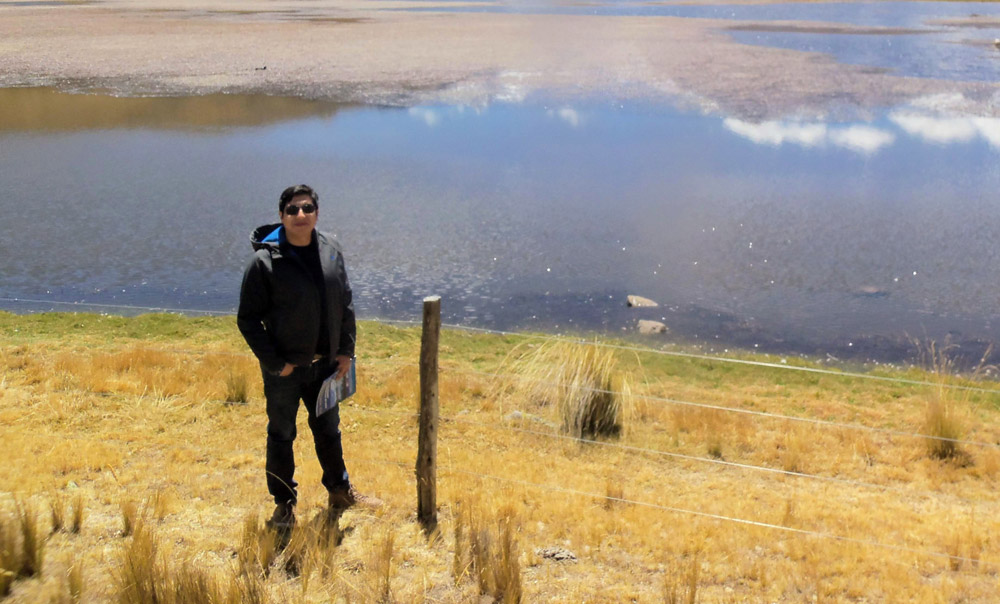Navigation auf uzh.ch
Navigation auf uzh.ch
Glacier retreat in the Andes has serious impacts on water availability for downstream populations. Future-oriented water management policies must take social factors into account. In his interdisciplinary PhD project, Randy Muñoz Asmat combines hydrologic modelling with local community consultation.

We develop model calculations on glaciers and water availability. Then we link these models to how local people perceive climate change and how they manage their water resources over the years. We want to understand how people use water and gain insights into the associated interactions with climate change. Geographically, we are focusing on the upper Vilcanota-Urubamba basin in Cusco, a region in the Peruvian Andes. Little data is available from there on communal water management, use and availability. However, models on glacial retreat predict a severely decreased runoff in the near future. Finding possible adaptations and improvements for future water management could prove crucial for the livelihoods of the local communities.
Most water management policies by Peruvian government bodies rely on simulations of water availability and demand based on population figures in the regions. But these policies do not take other important factors into account. As part of our research, we interview local communities and ask questions such as
With this interdisciplinary approach, which combines glacial-hydrological modelling with local community consultation, we are incorporating the social aspects. This is of great importance for future water management policies to ensure agriculture and livelihood in these areas.
Surprisingly, many people did not notice any climate change over the last twenty years and reported that they had enough water for agricultural and other activities, at least until about five years ago. We see a clear discrepancy between what science says about climate change and how local people perceive it.
One reason could be that the Andean communities do not see life in years or decades, but in daily time steps. This would explain why something that happened twenty years ago does not have much significance for them compared to what was yesterday or will happen tomorrow. Another reason could be linked to the high altitude of the region. Livestock farming is the main activity there, not agriculture. For this, water is used from small water bodies fed by groundwater, the so called Qochas. This source is less sensitive to precipitation, seasonality and short-term impacts of climate change.
I grew up in Huaraz, a city in the North of Peru. It is a hub for glaciological research in the heart of the Andes. Being surrounded by these glaciers and seeing them recede over my lifetime has influenced me to look into hydrology, glaciers and climate change. I did my bachelor's in environmental engineering in Peru. For my master's I went to Valencia.
Throughout my undergraduate studies I focused on hydrological simulations. That is how I met my current PhD supervisor. What I particularly like about my PhD project is the interdisciplinary nature of it. Combining social and physical science is a new challenge for me. And I am convinced that this kind of studies are essential for future Peruvian water management policies.
Muñoz, Randy; Huggel, Christian; Drenkhan, Fabian; Vis, Marc; Viviroli, Daniel (2021). Comparing model complexity for glacio-hydrological simulation in the data-scarce Peruvian Andes. J. Hydrol. Reg. Stud. 37, 100932.
Motschmann, Alina; Huggel, Christian; Carey, Mark; Moulton, Holly; Walker-Crawford, Noah; Muñoz, Randy (2020). Losses and damages connected to glacier retreat in the Cordillera Blanca, Peru. Climatic Change, 162(2):837-858.
Motschmann, Alina; Huggel, Christian; Muñoz, Randy; Thür, Angela (2020). Towards integrated assessments of water risks in deglaciating mountain areas: water scarcity and GLOF risk in the Peruvian Andes. Geoenvironmental Disasters, 7(1):26.
Franziska Schmid